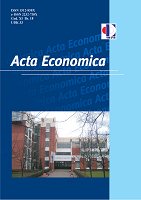Aнализа степена испуњености Мастрихтских критеријума конвергенције у Босни и Херцеговини
The analysis of the Bosnia and Herzegovina’s level of compliance with the Maastricht convergence criteria
Author(s): Branka Topić PavkovićSubject(s): National Economy, Developing nations, Political economy, EU-Approach / EU-Accession / EU-Development, Financial Markets, Public Finances, Socio-Economic Research
Published by: Економски факултет Универзитета у Бањој Луци
Keywords: monetary integration; the optimum currency area theory; EMU; convergence criteria; (macro)economic indicators of BiH;
Summary/Abstract: The idea of forming the European Monetary Union (EMU) derives from the fact that monetary integration has considerable economic advantages in lower transaction costs, greater price transparency and monetary stability. Аccording to the optimum currency area (OCA) theory, it is very important for member states to achieve high level of convergence in order to exploit advantages of integrating and conducting a common policy. Maastricht convergence criteria imply that a country that enters the European Monetary Union (EMU) has a relatively low inflation, a stable currency, low budget deficits, relatively low interest rates and sustainable public debt. Before gaining the position of candidates for EMU, Bosnia and Herzegovina has to become a member of the EU and to achieve the criteria for membership related to the development of political, economic, administrative and judicial institutions. Since the Maastricht convergence criteria are more precise than other criteria, in the economic literature are oft en used as an indicators of the readiness of the candidate countries to access the E(M)U. In addition to consideration of theoretical and empirical knowledge about the monetary integration, the main goal of this paper is to, using the comparative analysis of actual economic performance of BiH and the region, provides us with knowledge and assessment of BiH stage of compliance with the Maastricht convergence criteria. The results show that a rational solution for BiH, aft er joining the EU, is based on gradual process of monetary integration, with stable monetary policy, effective management of public finances and careful management of public debt. The long-term goal of BiH lies in achieving real convergence through increased productivity and competitiveness.
Journal: Acta Economica
- Issue Year: 11/2013
- Issue No: 18
- Page Range: 337-362
- Page Count: 26
- Language: Bosnian, Croatian, Serbian

